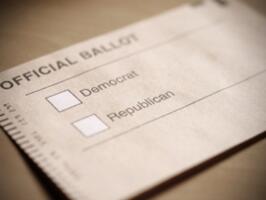Generic Congressional Ballot: Republicans 39%, Democrats 38%
Republicans still hold a one-point lead over Democrats on the Generic Congressional Ballot for the week ending July 14, 2013.
A new Rasmussen Reports national telephone survey shows that 39% of Likely U.S. Voters would vote for the Republican in their district’s congressional race if the election were held today, while 38% would choose the Democrat instead. Last week, Republicans also led by one—40% to 39%.
(Want a free daily e-mail update? If it's in the news, it's in our polls). Rasmussen Reports updates are also available on Twitter or Facebook.
The national telephone survey of 3,500 Likely Voters was conducted by Rasmussen Reports from July 8-14, 2013. The margin of sampling error for the survey is +/- 2 percentage point with a 95% level of confidence. Field work for all Rasmussen Reports surveys is conducted by Pulse Opinion Research, LLC. See methodology.
















